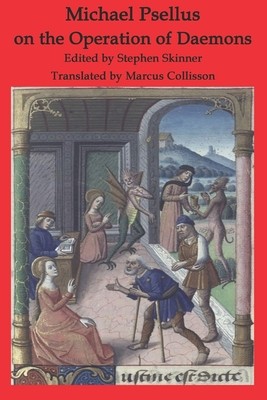
- We will send in 10–14 business days.
- Publisher: Golden Hoard Press
- ISBN-10: 1912212129
- ISBN-13: 9781912212125
- Format: 15.2 x 22.9 x 0.6 cm, minkšti viršeliai
- Language: English
- SAVE -10% with code: EXTRA
Michael Psellus on the Operation of Daemons (e-book) (used book) | bookbook.eu
Reviews
Description
Michael Psellus (1018 - 1178 C.E) forms the bridge between the ancient classical view of the daemon as a beneficial guiding spiritual presence (a link between man and the gods) and the later Christian view of demons as intrinsically evil. His writing helps to explain both of these aspects, and the evolution from one to the other. Psellus was a noted author and philosopher of the Byzantine era in the Greek speaking part of the Roman Empire centred on modern Istanbul. Up until the arrival of the Arabs in the 7th century, the Byzantine empire was one of the strongest economies of Europe, being at the western end of the silk road from China. Psellus was a very practical man, being an illustrious political advisor to a succession of emperors, but was also interested in angels and demons. He was the driving force behind the university curriculum reform designed to emphasise the Greek classics, especially Homeric literature rather than just Christian theology. He was also adept at astronomy, medicine, music, theology, jurisprudence, physics, grammar and history. This work, 'Dialogue on the Operation of Daemons, ' has been repeatedly cited in serious and academic literature and offers an interesting look at the Orthodox Christian conceptions of the roles of daemons and devils. His dialogue between Timothy and Thracian explores this line of thought in a truly Platonic form.
- Publisher: Golden Hoard Press
- ISBN-10: 1912212129
- ISBN-13: 9781912212125
- Format: 15.2 x 22.9 x 0.6 cm, minkšti viršeliai
- Language: English English
Michael Psellus (1018 - 1178 C.E) forms the bridge between the ancient classical view of the daemon as a beneficial guiding spiritual presence (a link between man and the gods) and the later Christian view of demons as intrinsically evil. His writing helps to explain both of these aspects, and the evolution from one to the other. Psellus was a noted author and philosopher of the Byzantine era in the Greek speaking part of the Roman Empire centred on modern Istanbul. Up until the arrival of the Arabs in the 7th century, the Byzantine empire was one of the strongest economies of Europe, being at the western end of the silk road from China. Psellus was a very practical man, being an illustrious political advisor to a succession of emperors, but was also interested in angels and demons. He was the driving force behind the university curriculum reform designed to emphasise the Greek classics, especially Homeric literature rather than just Christian theology. He was also adept at astronomy, medicine, music, theology, jurisprudence, physics, grammar and history. This work, 'Dialogue on the Operation of Daemons, ' has been repeatedly cited in serious and academic literature and offers an interesting look at the Orthodox Christian conceptions of the roles of daemons and devils. His dialogue between Timothy and Thracian explores this line of thought in a truly Platonic form.


Reviews